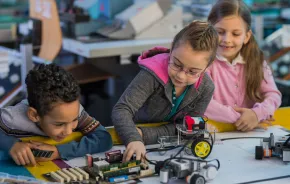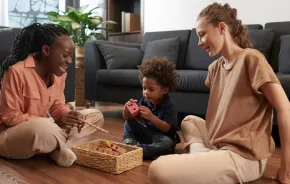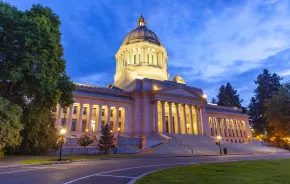Photo:
NAACP Youth Coalition; photo credit: Jon Greenberg
Seattle’s adults have a bad case of racism denial, often clinging to our progressive reputation despite living in homes with illegal racial restrictions on the deeds and sending our children to schools with the second-highest racial achievement gap in the United States. In the face of Seattle schools’ long history of addressing inequity while failing to change it, local teens aren’t willing to wait until they’re grown to make a difference. They are ready to confront racism themselves.
“People tell you that no real change will happen, or that you can only affect little things. But I feel like I’m in good groups. I’ve always been interested [in making a difference] and I thought, ‘When will I get a better chance?’” says Bethel Getu, a sophomore at Garfield High School. Getu is a student representative on the school’s Race and Equity Team, which developed the curriculum for this year’s Black Lives Matter at School National Week of Action (Feb. 4–8).
“I really feel like our plan for Black Lives Matter this year is better than last year. We were able to get more ideas from students,” says Getu. She is even more excited about the year-round work that they do. “We talk about the entire school curriculum and find ways to make it more equitable. In geometry, when you learn the Pythagorean Theorem, you always learn that it was discovered by a Greek named Pythagoras. You never learn about the Arabic discovery of algebra,” she says.
The team helped Garfield become the first school in Seattle to receive a teacher education grant to improve equity in the classroom. “We’ve established a year-long project to celebrate heritage months with student presentations during advisory period,” she says.
Getu also serves as a senator for Garfield’s Black Student Union, which plans the school’s Martin Luther King, Jr. Day celebration. The BSU also hosts the annual Soul Night community celebration with speakers, entertainers, food and vendors drawn from the Black community.
With the year’s two largest events behind them, Garfield’s BSU is not resting on its laurels. They have partnered with the youth group New Generation and author Jeanne Theoharris to edit her book “The Rebellious Life of Mrs. Rosa Parks” for younger readers. They are hopeful that the abridged book will be incorporated into SPS’ ethnic studies curriculum, which is still in development.
Getu has some personal goals, as well. “I want to get more participation in future actions. There are still some people who don’t feel like this work is relevant to them,” she says.
Another student activist focusing on collaboration is Emma Fedore, a senior at Ballard High School, and a leader in the NAACP Youth Coalition. The district-wide student coalition advocates for equity in education. Their testimony at school board meetings was instrumental in the district’s endorsement of Black Lives Matter at School Week, and they also took the lead on organizing a rally at the Feb. 6 school board meeting to present a list of demands, including mandatory ethnic studies, hiring and retaining more teachers of color and the equitable distribution of educational resources.
“Being white, I don’t want to coopt the experience of others,” says Fedore, who concentrates her involvement behind the scenes with planning and graphic design. When she does take the stage to testify at school board meetings, she limits herself to speaking about what she knows from experience — the importance of ethnic studies. “I’ve experienced those classes and had my eyes opened by them,” she says. “In seventh grade, my history teacher taught us about the internment of indigenous people in Alaska, a blemish on our history that no standard American history textbook covers. I was lucky to be given an opportunity to confront my ignorance and learn about others,” she says.
“In the North end, schools need to work on fostering respect. Inequity is more tangible elsewhere. In the South end, we need to make sure students are served. Our friends at Rainier Beach are demanding basic necessities. They have to deal with leaky roofs.” Before she graduates, Fedore hopes to strengthen the coalition by connecting students in the North and South ends of the district at a youth summit.
“Here at Ballard, it’s about facilitating discussions of race and equity, and making sure students of color are safe from microaggressions. We have to make students see why it’s important to work for equity,” she says. Fedore is the vice president of Ballard’s STAR Club (Students and Teachers Against Racism), which focuses on the school community through classroom discussions and, in partnership with Ballard’s Black Student Union, the annual Martin Luther King, Jr. assembly. At the assembly this year, they talked about the importance of reading diversely. “Afterwards, a student approached me and told me that the assembly motivated them to check out books by authors of color from the library.”
If you want to see change, you have to do something about it. You can’t wait for someone else to do the work for you.
Both Fedore and Getu became involved in equity activism through school, but both of them acknowledge the importance of their parents’ support. “My parents are very involved in politics,” says Fedore. “Equity is nonpartisan, but my mom is a huge advocate of getting involved, and since I’ve become an activist, we’ve had more discussions about race and equity at home.”
Getu says, “My parents put so much emphasis on the power of education. They encouraged me to be aware of current events even at a young age. My family is Ethiopian, so I’ve always had two news sources — the U.S. news and the news about what’s happening back home — and that has given me a broader perspective. Also, they drive me around to my activities when I can’t take the bus.”
Getu has good advice for both parents and other teens. “If you want to see change, you have to do something about it. You can’t wait for someone else to do the work for you.”











